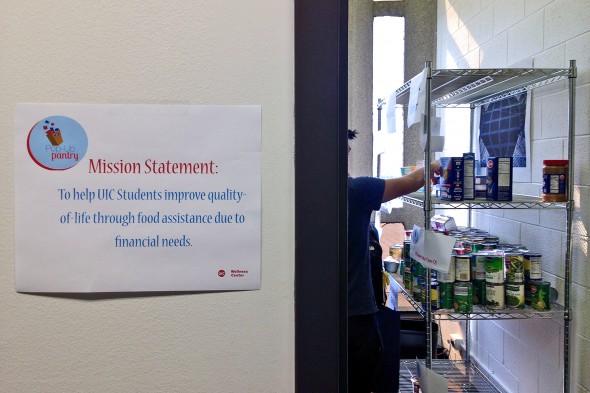Filling stomachs, minds of students

The UIC Pop-Up Pantry has provided donated food items to hundreds of UIC students. “It’s a super empowering environment,” said student director Katie Gonzalez.
Sifting through more than 100 thank-you notes from struggling students one Thursday afternoon, food pantry organizers picked out some of the most moving messages.
“Thank you so much,” one read. “I only have $7 for the next week and a half because I’m paying off loans.”
“My kids will be happier,” another student wrote.
The UIC Pop-Up Pantry dedicates itself to improving the lives of people like these Jane Does: UIC students who face economic hardships and financially straining times and aren’t always sure how they’ll afford their next meal.
“The pop-up pantry’s mission is to help those students who have constraints with hunger, whether it’s chronic or episodic,” said Carol Petersen, associate director of the Wellness Center.
Petersen co-founded the pantry in 2014. The initial launch served 104 students and handed out 832 of the pantry’s 3,784 donated food items.
Since then, the initiative has continued to feed them, help their mental health, protect their privacy, create a welcoming environment and serve more than 700 students. UIC is one of three Chicago universities to run an on-campus pantry for students experiencing food insecurity.
“We try to always improve it,” Petersen said.
Students are invited to today’s Pop-Up Pantry, from 10:30 a.m. to 2 p.m. in 613 Student Center East. A valid i-card is required, and students can grab a snack, sit, enjoy music and look at colorful posters while they wait their turn to fill a bag with food.
“It’s more of a shopping experience for them,” said student director Katie Gonzalez. “They get to go in and choose their groceries.”
Gonzalez organizes student volunteers, most from student organizations, that run the Pop-Up Pantry.
“Volunteers just facilitate the process,” said Gonzalez, who has worked with the pantry for over a year.
Volunteers pass out information sheets with facts and recipes, answer questions about nutrition and collect surveys.
Surveys taken for the pantry’s 2014–2015 report showed that 84 percent of students who go to the pantry are hungry because of financial issues.
“If you’re hungry and you’re worried about food and you’re worried about money, it’s hard to pay attention to studies because your basic, fundamental needs aren’t being met,” Petersen said.
Bags that students fill at the pantry help to feed them for three to seven days, which can fight or prevent malnutrition and boost their academic abilities.
“It’s a super empowering environment,” added Gonzalez, an undergraduate majoring in English. “I think students take a lot of pride in that: in choosing a volunteer opportunity that’s not really convenient to them but that’s directly helping their peers and their friends.”
Student involvement, like the volunteers that Gonzalez facilitates, make the pantry possible, but so do campus partners, including the UIC Wellness Center, Undergraduate Student Government, Office of the Dean of Students, Office of the Vice Chancellor of Student Affairs and Office of Advancement.
Dan Montes, co-director of the pantry, handles donations from departments across the campus through an elf program, where faculty and staff gather canned goods and nonperishable items for the pantry in bulk.
“The only reason we exist, and the only reason we work and function, is because people are taking care of us,” Petersen noted.
The elf system brings in donations once or twice a week. Independent donations are also encouraged with monthly food drives and individual drop-off opportunities. For more information on donation meet-ups, call 312-413-2120.
But the pantry strives to do more.
“We’re trying to give them the whole nine yards: not just giving students food, but also educating them,” said Montes, a UIC nursing student.
“A lot of students don’t know how to prepare a meal, and a lot of students don’t really know what they’re looking at and how to make that food into a meal,” Petersen said.
The team’s goal is to create nutritionally focused workshops and meal preparation demonstrations, where nutritional or practical meals are prepared using food items available at the pantry.
For now, the resources offered are invaluable.
“It’s really kind of a humbling experience when you see all of the people that you get to help,” Petersen said. “It really creates this positive wave that rolls across campus.”
Categories
